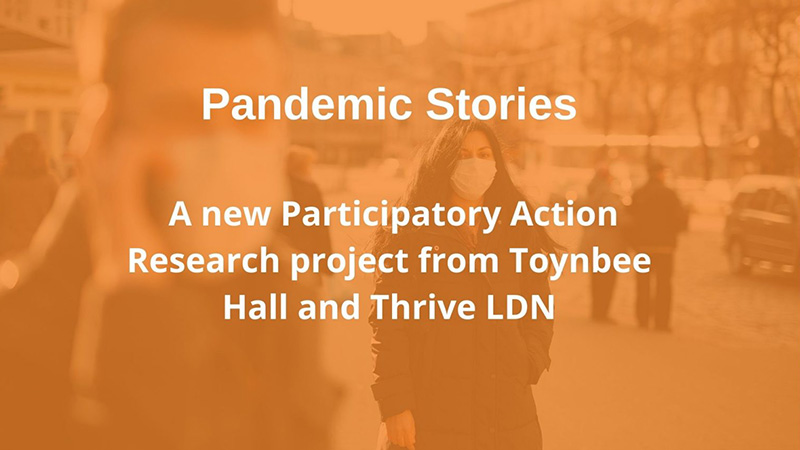
Thrive LDN working with Toynbee Hall on new participatory action research: Pandemic Stories


Toynbee Hall, in collaboration with Thrive LDN, is launching a new action research project today to understand how the COVID-19 crisis is affecting low income and other disproportionately affected households in London, including renters, disabled people and people from certain BAME communities.
Since 2017 Toynbee Hall has been building a network of community peer researchers and organisers by training local residents to conduct participatory action research with their neighbours, family, friends and workmates. For this project we have recruited 17 peer researchers with direct experience of the issues being investigated. With an age range spanning 20 to 70, and with 13 languages between them, they are able to reach deep into the local communities they live in.
Over the next few months they will use their networks to invite households in London to take part in the research, and will support their peers to record their experiences of the pandemic through interviews, self-filming, and diary writing. The community researchers will work with us to develop and shape policy solutions informed by the community’s insights.
Together with the Toynbee Hall Research and Policy Team, the community researchers have chosen to focus on how the following factors have impacted their peers’ wellbeing during the pandemic:
- Powerlessness over sources of income and expenditure
- The help and support households receive
- Digital access
- Mental health
This research will give policy-makers the opportunity to hear directly from those most affected by the unequal impact of COVID-19 about their challenges before and during the pandemic, and their own suggested solutions for increasing their financial resilience and wellbeing for the future.
Dan Barrett, Director, Thrive LDN said:
“Thrive LDN is delighted to be working with Toynbee Hall on this project to gain in-depth insights and understanding of issues affecting vulnerable and marginalised communities during the current crisis. We know from data, intelligence and research available that some individuals and communities are being more adversely affected by the coronavirus pandemic and we are working with a wide range of partners to help coordinate a collective response to the public mental health challenges which are developing in London.”
Sian Williams, Director of Policy and Innovation, Toynbee Hall said:
“The evidence is compelling that inequality costs lives and undermines well-being for us all, and COVID-19 has made this stark fact undeniable. We must work now to design out the systemic causes of inequality, so that the next pandemic doesn’t have the same disproportionate impact. At Toynbee Hall we believe that effective policy must include the perspective and participation of those people most affected; who knows better what will work effectively on the ground than the people living that reality? So we are excited that our peer research partnership with Thrive LDN offers the people directly affected by inequality the opportunity to help shape new policies aimed at designing a fairer and happier society.”